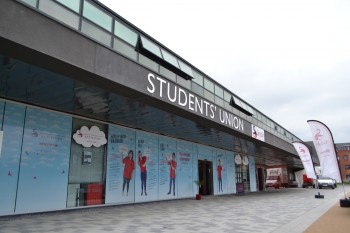Voting for the NUS referendum began on Monday, with the University of Lincoln Students’ Union asking for a second time if it should remain or leave the national organisation.
On Monday night, the official campaigns argued their case in a debate. You can read our live-blog from the evening here.
Today Liam O’Dell, The Linc’s News Editor, gives his take on the event…

It was a debate which started in a rather awkward fashion. Only around 20 students were in attendance – leading to a dull, quiet atmosphere while hinting that more needs to be done to engage students in student politics.
The SU are remaining impartial throughout the duration of this campaign and as such it was the elected leaders of the official campaigns who would make their respective cases at this debate.
The hiccup at the start of proceedings regarding who was giving the opening statement on behalf of Yes to NUS didn’t help either.
Michael Daniell, from Keep Lincoln Independent, made his case first with a speech that sounded identical to his guest column for The Linc.
Meanwhile, Connor Delany and Calum Watt from the Yes to NUS campaign – also see Connor’s guest column here – took it in turns to raise points and answer audience questions throughout the evening. The fact the ‘yes’ campaign had an additional spokesperson at the debate to help was an issue that didn’t attract as much of a discussion as it probably should have.
Connor and Calum had the benefit of conferring throughout the evening, while Michael had to tackle questions on his own – something which isn’t really fair for his campaign.
The debate wasn’t without a slight bit of theatre, either. Michael showed members a printout of the long list of policies the NUS has regarding LGBT issues, while Connor and Calum had a recent financial report to hand.
This, alongside the fact that the event was held in a smaller venue than last year, were the only things which stopped the debate from being a complete carbon copy of the one from the previous academic year.
For students who had a say in the first referendum, last night’s event served as nothing more than a reminder. It would have been of more interest to first year students to hear what either party had to say.
After all, one of the main reasons for a second vote was so those who have just enrolled don’t have to see the SU make a decision that they didn’t have any say over. It’s a point well-made – if only first years actually turned up.
Aside from the sense of déjà vu when watching a second debate, branding the NUS vote as Lincoln’s EU referendum is a bizarre comparison, but there are some similarities.
Yes to NUS repeatedly make the same economic point about NUS extra cards, but with the occasional mention about having a voice on a more national level. Keep Lincoln Independent, on the other hand, raises arguments about the NUS’ extensive list of policies, yet cannot comment on the financial impact of a vote to disaffiliate. The ‘yes’ side focuses on the economic benefits, while the ‘no’ campaign argues that the body’s agenda has shifted. Does this ring any bells?
Whilst there were plenty of questions from those who attended the evening’s debate, it’s incredibly likely that there would have been more had the event been advertised on a larger scale.
The debate brought up the same questions from the last referendum for both sides to answer, but there’s one question which spans outside this debate.
With so few people voting the first time round, poor attendance at the debate and an early finish due to a lack of questions, do University of Lincoln students actually care about student politics?

